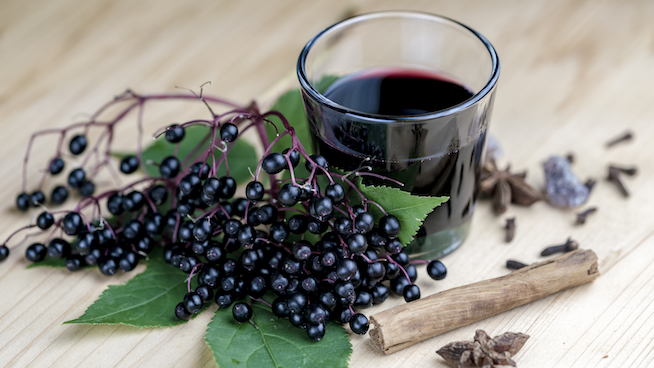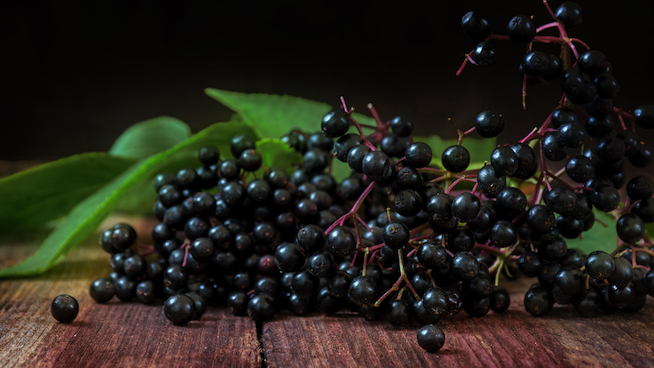Elderberry: Why Every Athlete Should Know This Natural Flu Fighter
Flu season is here with a vengeance.
It doesn’t matter how fit you are or how invincible you may feel—the flu can sideline anyone for 5-14 days, wreaking havoc on your routine. An extended absence from school or work can put you behind the eight ball for the rest of the year. An extended break from training can mean a precipitous drop in your gains. A reduced appetite can mean significant muscle loss. The flu is no joke, and you need to do your best to protect yourself against it.
Flu Vaccine
The CDC recommends the annual flu vaccine as the first line of defense against the flu.
Protect Yourself
But there are other steps you can take to protect yourself. While much of vitamin C’s protective effects against cold and flu have been massively overblown, there’s research that says taking a vitamin C supplement prior to the onset of symptoms could reduce the duration of a cold by 8 percent in adults and 14 percent in children. The results are more significant for athletes who engage in “periods of severe physical exercise.” But you already know about vitamin C. I’m here to tell you about a different natural cold and flu remedy worth leveraging—elderberry.

What Are Elderberries?
Also known as “sambucus berries,” elderberries are the dark violet-black drupes that grow in clusters on the sambucus genus of flowering plants. Edible only when fully ripe, elderberries are high in vitamin C, vitamin B6 and iron. But these ingredients don’t fully explain the significant positive impact elderberries have been found to have on cold and flu-like symptoms.
What Are Elderberries Used For?
- Chronic fatigue syndrome.
- Constipation.
- Hay fever.
- Headaches.
- High cholesterol.
- Sinus infections.
- Sciatica.
- Toothaches.
- Upper respiratory infections.
Elderberries And Our Immune System
Elderberries are very high in several phenolic compounds known to enhance the immune system’s response. These compounds include anthocyanins, the substance that gives them their distinct dark color. Black elderberries are the most concentrated form of anthocyanins among all fruits. Anthocyanins are powerful antioxidants that boost the body’s immune system.
They’ve also been found to increase the body’s production of beneficial cytokines, proteins that act as messengers within the body that improve the immune system’s response to virus. Research has found they can also decrease influenza viruses’ ability to replicate inside the body.
Elderberries also contain hemagglutinin protein, which, according to the Pharmacy Times, “has been shown to stop a virus’s capability to replicate by inhibiting its ability to penetrate the cell wall, thereby preventing the virus from causing infection if taken before exposed. If elderberries are taken after infection, that keeps the virus from spreading, which reduces the duration of influenza symptoms.”
Studies have also found that elderberry consumption can lead to higher level of antibodies targeting the influenza virus.
What Studies Are Saying
While we have only recently begun to understand the mechanisms of how elderberry affects immunity and cold and flu-like symptoms, the fruit has long been used to improve health. There’s reason to believe elderberry-based medications were used by the Ancient Egyptians, and it appeared in the writings of Greek physician Hippocrates, who’s often referred to as the “Father of Medicine.” Sambucol is a line of products that utilize black elderberry extract as an ingredient for cold and flu prevention and relief. The proprietary elderberry extract used in Sambucol has been used in several published clinical studies.
One double-blind study was conducted on 27 individuals with influenza whose symptoms had been present less than 24 hours. 93.3% of the individuals who received Sambucol saw significant improvement in their symptoms within two days, while 91.7% of the placebo group didn’t see similar improvement until Day 6. Complete resolution of symptoms was achieved within two to three days by approximately 90% of the group who took Sambucol.
“Immune system tests found a higher level of influenza antibodies in patients receiving elderberry than those receiving the placebo, suggesting enhanced immune activity,” the American Botanical Council wrote in a summary of the findings.
A second double-blind study was conducted on 60 adults with influenza whose symptoms had been present less than 48 hours and showed similar results. The Sambucol group showed pronounced improvement after a mean of 3.1 days compared to 7.1 days for the placebo group. The Sambucol group also utilized 74 percent less painkillers and nasal spray than the placebo group.
These studies illustrate Sambucol’s positive impact on flu symptoms to be similar to that of prescription medications like Tamiflu, but the products don’t with any of the same nasty side effects (Tamiflu is notorious for causing nausea and vomiting, for example). This means that elderberry can also be used as a preventative measure, as well. If you’re worried about coming down with a cold or flu, it may make sense to supplement it on a daily or semi-daily basis. Sambucol produces a gummy for just such situations.

While Sambucol is the most widely available elderberry-based supplement, there are a number of other ones out there. Syrups, tablets, lozenges—you name it. Amazon sells a number of elderberry-based products, and the reviews are typically a good indication of how effective they’ve been for others. If you’re looking to add some extra firepower to your fight against cold and flu season, elderberry may be your answer.
Photo Credit: elfgradost/iStock, Maren Winter/iStock
READ MORE:
RECOMMENDED FOR YOU
MOST POPULAR
Elderberry: Why Every Athlete Should Know This Natural Flu Fighter
Flu season is here with a vengeance.
It doesn’t matter how fit you are or how invincible you may feel—the flu can sideline anyone for 5-14 days, wreaking havoc on your routine. An extended absence from school or work can put you behind the eight ball for the rest of the year. An extended break from training can mean a precipitous drop in your gains. A reduced appetite can mean significant muscle loss. The flu is no joke, and you need to do your best to protect yourself against it.
Flu Vaccine
The CDC recommends the annual flu vaccine as the first line of defense against the flu.
Protect Yourself
But there are other steps you can take to protect yourself. While much of vitamin C’s protective effects against cold and flu have been massively overblown, there’s research that says taking a vitamin C supplement prior to the onset of symptoms could reduce the duration of a cold by 8 percent in adults and 14 percent in children. The results are more significant for athletes who engage in “periods of severe physical exercise.” But you already know about vitamin C. I’m here to tell you about a different natural cold and flu remedy worth leveraging—elderberry.

What Are Elderberries?
Also known as “sambucus berries,” elderberries are the dark violet-black drupes that grow in clusters on the sambucus genus of flowering plants. Edible only when fully ripe, elderberries are high in vitamin C, vitamin B6 and iron. But these ingredients don’t fully explain the significant positive impact elderberries have been found to have on cold and flu-like symptoms.
What Are Elderberries Used For?
- Chronic fatigue syndrome.
- Constipation.
- Hay fever.
- Headaches.
- High cholesterol.
- Sinus infections.
- Sciatica.
- Toothaches.
- Upper respiratory infections.
Elderberries And Our Immune System
Elderberries are very high in several phenolic compounds known to enhance the immune system’s response. These compounds include anthocyanins, the substance that gives them their distinct dark color. Black elderberries are the most concentrated form of anthocyanins among all fruits. Anthocyanins are powerful antioxidants that boost the body’s immune system.
They’ve also been found to increase the body’s production of beneficial cytokines, proteins that act as messengers within the body that improve the immune system’s response to virus. Research has found they can also decrease influenza viruses’ ability to replicate inside the body.
Elderberries also contain hemagglutinin protein, which, according to the Pharmacy Times, “has been shown to stop a virus’s capability to replicate by inhibiting its ability to penetrate the cell wall, thereby preventing the virus from causing infection if taken before exposed. If elderberries are taken after infection, that keeps the virus from spreading, which reduces the duration of influenza symptoms.”
Studies have also found that elderberry consumption can lead to higher level of antibodies targeting the influenza virus.
What Studies Are Saying
While we have only recently begun to understand the mechanisms of how elderberry affects immunity and cold and flu-like symptoms, the fruit has long been used to improve health. There’s reason to believe elderberry-based medications were used by the Ancient Egyptians, and it appeared in the writings of Greek physician Hippocrates, who’s often referred to as the “Father of Medicine.” Sambucol is a line of products that utilize black elderberry extract as an ingredient for cold and flu prevention and relief. The proprietary elderberry extract used in Sambucol has been used in several published clinical studies.
One double-blind study was conducted on 27 individuals with influenza whose symptoms had been present less than 24 hours. 93.3% of the individuals who received Sambucol saw significant improvement in their symptoms within two days, while 91.7% of the placebo group didn’t see similar improvement until Day 6. Complete resolution of symptoms was achieved within two to three days by approximately 90% of the group who took Sambucol.
“Immune system tests found a higher level of influenza antibodies in patients receiving elderberry than those receiving the placebo, suggesting enhanced immune activity,” the American Botanical Council wrote in a summary of the findings.
A second double-blind study was conducted on 60 adults with influenza whose symptoms had been present less than 48 hours and showed similar results. The Sambucol group showed pronounced improvement after a mean of 3.1 days compared to 7.1 days for the placebo group. The Sambucol group also utilized 74 percent less painkillers and nasal spray than the placebo group.
These studies illustrate Sambucol’s positive impact on flu symptoms to be similar to that of prescription medications like Tamiflu, but the products don’t with any of the same nasty side effects (Tamiflu is notorious for causing nausea and vomiting, for example). This means that elderberry can also be used as a preventative measure, as well. If you’re worried about coming down with a cold or flu, it may make sense to supplement it on a daily or semi-daily basis. Sambucol produces a gummy for just such situations.

While Sambucol is the most widely available elderberry-based supplement, there are a number of other ones out there. Syrups, tablets, lozenges—you name it. Amazon sells a number of elderberry-based products, and the reviews are typically a good indication of how effective they’ve been for others. If you’re looking to add some extra firepower to your fight against cold and flu season, elderberry may be your answer.
Photo Credit: elfgradost/iStock, Maren Winter/iStock
READ MORE:











